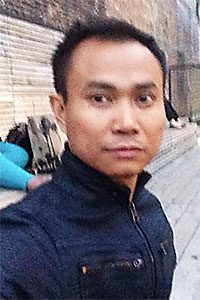
A string of legislative attacks by Cambodia's ruling regime against its critics and the opposition party since last year have baffled me, not only for their senselessness and brutality, but for the similarity they share with political tactics invented here in Thailand.
As its legislative bullying was extreme enough to wipe out its political enemies, I did not expect the regime of Prime Minister Hun Sen to go further. But it did on May 12, with the arrest of a 50-year-old primary school principal for an alleged lese majeste offence which carries up to five years in prison.

Surasak Glahan is Deputy Editorial Pages Editor, Bangkok Post.
Kheang Navy is the first person in Cambodia to be charged under a new lese majeste law, passed by the government in February. He was arrested for a Facebook post and has been in prison on pre-trial detention.
It is unlikely he will be the last. Rights groups have warned that the law could be exploited as another government political tool to target dissent. Concerns over exploitation of a similar law in Thailand have already been raised for years. Roughly two weeks prior to the arrest of Kheang Navy, Bangkok Remand Prison finally released Somyot Prueksakasemsuk, the former editor of the now-defunct Voice of Taksin magazine, after he had served seven years in jail for lese majeste and defamation for publishing two articles in 2010.
Given that there is no shortage of examples of extreme government repression tactics in our Southeast Asian region, the so-called "Asean Community" we are told to be proud of, you may wonder why the Hun Sen regime opted for the Thai models to silence its critics.
For one thing, I believe it has been proved that the Thai political repression models work. In addition to abuses of the lese majeste law as political tools against opponents, Thailand's ruling regimes have never run short of other legislative attacks against their critics and opposition groups. From political party dissolution cases to the current regime's invention of a law with retroactive effects, Thailand has seen many legislative strategies used to corner those running a highly popular political camp that has stood as a threat to the establishment. It's a simple solution: Invent new legislation or exploit existing laws.
Hun Sen must have realised the tactics worked well for their neighbour and that's why he adopted them as part of his political purge against opponents ahead of general elections next year. He is alleged to have pulled the strings behind many baseless legislative attacks against the Cambodia National Rescue Party and its leader Kem Sokha. Last year, the party was effectively dissolved by the Supreme Court at the request of the government.
Of course, that could not take place without the making of a law that enables it. Prior to the dissolution case, MPs of the ruling Cambodia People's Party simply amended the law on political parties, making it possible for parties to be dissolved if their leaders are criminally convicted. After that, the CNRP's leader, Sokha, was arrested and jailed for treason merely because of his political remarks at an event.
But the Thai military regime seems to have noticed how well its own tactics are working in Cambodia, and has doubled down on local efforts. Similar to the case against Sokha, the National Council for Peace and Order (NCPO)'s legal department last week filed a complaint with police against eight leaders of the Pheu Thai Party, whose caretaker government was ousted by a 2014 coup.
The offence? The politicians made remarks at a press conference last week criticising the regime on its failure to deliver promises over the past four years. Sedition is among the four charges brought against them. The NCPO's action has prompted speculation it could lead to a third case of party dissolution against this political camp. If the rumours come true, Prime Minister Prayut Chan-o-cha's alleged ambition to return to power after a general election, tentatively planned for February next year, may go more smoothly than first thought. The regime-sponsored constitution already allows the military to share power through the selection of 250 senators for the first five years after the poll. Dissolution of a major party will strengthen Gen Prayut's ambitions in the post-2019 poll. On this front, Hun Sen is a step ahead. Wiping out the popular opposition party will help him secure victory in the upcoming poll.
At the end, it is hard to say who copied whom. But the government's adoption of identical legislative attacks against opponents is an increasingly appalling and alarming trend both here and in Cambodia.
